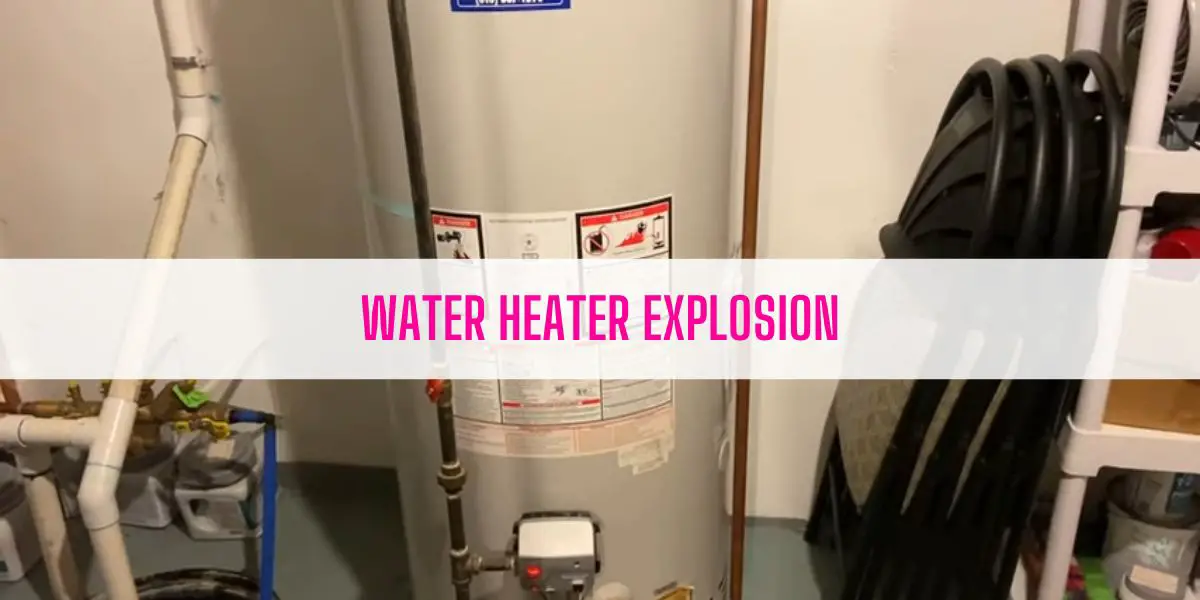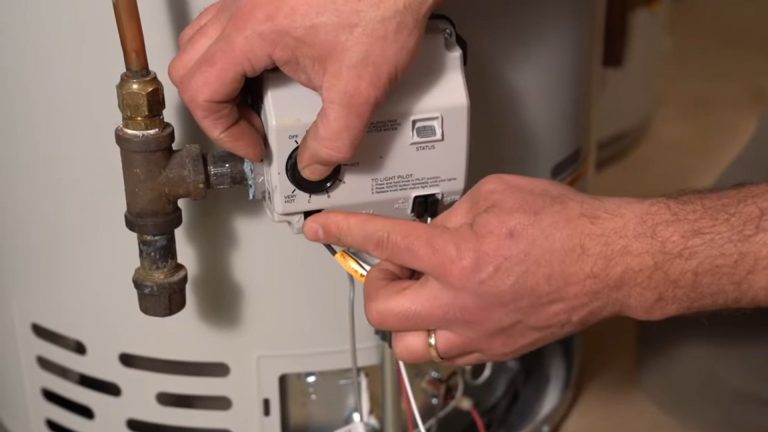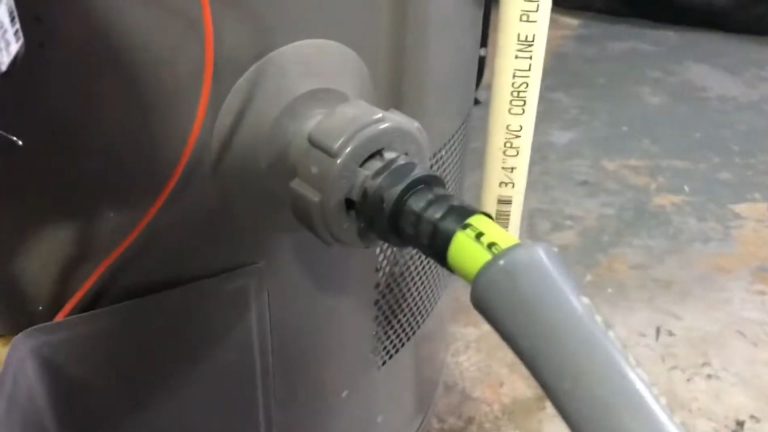Water Heater Explosion: Causes, Signs, and Preventive Measures
Modern water heaters come with advanced safety features like pressure relief valves. They release pressure when excessive or abnormal pressure builds up inside the tank. So, it’s a rare occurrence like a water heater explosion.
But the question is- can a water heater really explode despite having the safety mechanisms? The answer is- Yes. Fortunately, I will cover everything, like what causes the water heater to explode and what you should do to prevent such a catastrophic situation. Without further ado, let’s dive in.
Table of Contents
- What Causes Water Heater Explosion?
- What Happens When A Water Heater Explodes?
- What Are The Warning Signs of Water Heater Explosion?
- How To Prevent Water Heater Explosion
- Verify That The Pressure Relief Valve Is Functional
- Stay With The Recommended Temperature Setting
- Monitor Pressure Levels
- Maintain the Routine Maintenance Workflow
- Inspect for Corrosion & Rust
- Check for Sediment Buildup
- Install An Expansion Tank
- Ensure Proper Installation
- Address Gas Leak Promptly
- Educate Yourself on Emergency Response
- How Often Do Water Heaters Explode?
What Causes Water Heater Explosion?
Water heater explosions can be disastrous and are often caused by excessive pressure, gas leaks, and heat expansion. Identifying these issues early on and taking preventative measures can save you from a water heater explosion’s potential dangers and expenses. Below are some common causes to be aware of.
Excessive Pressure
One of the most common reasons for water heater explosions is the buildup of excessive pressure inside the tank. This can happen when the temperature and pressure relief valve (TPR valve) malfunctions. As the water gets heated up, it expands, and if the pressure is not appropriately relieved, it can cause a hazardous increase in pressure inside the tank.
Gas Leak
Gas water heaters can be extremely hazardous if not handled appropriately. In the event of a gas leak, gas buildup inside the appliance can lead to a catastrophic explosion if ignited. Therefore, to avoid potential safety risks, it is crucial to ensure that your gas water heater is installed and maintained correctly, with proper ventilation. Take action now to protect yourself and your loved ones from harm.
Heat Expansion
It’s crucial to understand that when water is heated, it expands, and if not managed properly, it can create a dangerous situation by increasing pressure within the tank. Therefore, ensuring that your heating system has a well-functioning TPR valve designed to release excess pressure and prevent any potential damage or hazards is vital. Don’t take risks, and make sure your heating system is safe and sound!
Fire
It’s important to exercise caution when it comes to your water heater. If it explodes and there are any flammable materials or open flames in the vicinity, it could start a fire. This scenario is more likely to occur if your water heater is located in a confined space with insufficient air circulation.
Corrosion & Rusting
As time goes by, the tank can start to break down and weaken due to rust and other types of damage. This can cause the tank to fail and potentially cause problems from the pressure inside.
Sediment Buildup
As time passes, a water heater tank can collect dirt, sand, and other particles at its base. This pile-up can cause the tank to overheat and the pressure to rise, which can be dangerous and even lead to an explosion.
Improper or Bad Installation
It’s crucial to take swift action when you notice any indications of shoddy installation, such as loose fittings, defective gas lines, or insufficient ventilation, to prevent possible hazards like explosions.
Avoiding Routine Maintenance
Ensuring regular maintenance is crucial to prevent potential issues from becoming more serious. Refraining from performing routine maintenance tasks, like flushing the tank to remove sediment or checking the TPR valve, can lead to significant problems later.
What Happens When A Water Heater Explodes?
A water heater explosion can lead to a hazardous and potentially catastrophic situation. The consequences can vary based on the type of water heaters (gas or electric) and the intensity of the explosion. Below are some possible outcomes:
Tank Rapture
Tank rapture is the most immediate and severe consequence of a water heater explosion. By default, the water heater’s tank is specially designed to hold water under pressure. If the pressure buildup goes beyond the handling capacity of the tank, it can cause the tank to burst open. Consequently, it releases a large volume of hot water & steam.
Scalding Injuries
As I mentioned earlier, a water heater explosion can cause the tank to release hot water and steam. The tank water temperature is higher than the normal operating temperature. It can cause severe burns & scalding injuries if anyone comes in touch when the tank pops.
Structural Damage
Due to the force of the explosion, the structure around the water heater area can collapse. It may bring damage to walls, ceilings, and nearby fixtures. In the worst cases, the explosion could even lead to structural instability.
Fire Hazard
If the popping water heater is gas-powered, an explosion can result in a fire hazard. The ignition of gas can lead to flames, posing a risk of fire spread out.
Water Damage
A tank water heater stores a large volume of water in the tank. If it bursts open or explodes, the water inside the tank floods the basement or the floor. It can lead to unimaginable property damage, including floor, walls, or belongings.
Structural Failure of the Water Heater System
An explosion of a water heater can cause damage to the entire system, including the tank, pipes, valves, and other components.
What Are The Warning Signs of Water Heater Explosion?
You don’t want to experience the disastrous consequences of a water heater explosion. That’s why you should be aware of the warning signs indicating potential issues with your water heater. Look out for red flags like strange noises or leaks. Pay attention to the signs – take action to ensure your safety and avoid any accidents.
Leaking Pressure Relief Valve
If you notice water continuously leaking from your pressure relief valve (TPR valve), it could be a sign of a malfunction caused by excessive pressure within the tank. So take immediate action to ensure your system’s safety and proper functioning.
Defective Pressure Relief Valve
If the pressure relief valve (TPR valve) fails to function correctly, it could result in a dangerous pressure surge within your water heater, as it would be unable to release surplus pressure as intended.
A Consistent Popping or Knocking Noise
It is crucial to be aware of the sediment buildup at the tank’s bottom as it can lead to several issues, such as strange noises, overheating, increased pressure, and even the possibility of an explosion. Please don’t ignore this potential hazard; take steps to prevent it.
Rotten Egg Odor
Beware! If you smell something strange, like rotten eggs coming from your hot water, it might indicate the presence of a hazardous gas called hydrogen sulfide. The gas is produced when bacteria react with an anode rod in your water heater. Ignoring this issue can lead to a potential explosion, putting your safety at risk. Take immediate action to avoid any unwanted consequences.
Brown or Unclear Water
Do you notice any discoloration or ambiguity in the water coming from your hot water taps? If so, it could indicate rust or corrosion inside your water heater tank. This issue weakens the tank’s structure and elevates the risk of tank failure. Please don’t wait until it’s too late; take prompt action to prevent further damage and verify your utmost safety.
Gas Leak
A gas leak around your water heater can be hazardous. The gas odor is a telltale sign of danger and must be taken seriously. In such a situation, you should evacuate the area immediately and contact emergency services for assistance. Remember, gas leaks can cause explosions if the gas comes into contact with a spark. Don’t take any chances with your safety!
How To Prevent Water Heater Explosion
Here are some tips to help you avoid water heater explosions and keep you and your family safe:
Verify That The Pressure Relief Valve Is Functional
Regularly check the pressure relief valve (TPR valve) to ensure it works correctly. To operate the pressure relief valve manually, try these steps:
- Lift the valve until the brass stem rises to open the pressure relief valve.
- Once you open the valve successfully, hot water will rush through the pipe near the bottom of the tank.
- Close the valve by pushing the lever back down.
If the pressure relief valve works as I mentioned, understand the valve is functional. A functional pressure relief valve will help release excess pressure buildup inside the tank.
You must replace the valve immediately if the TPR is dripping or not working as intended.
Stay With The Recommended Temperature Setting
Water heater manufacturers advise setting the temperature to 120 degrees Fahrenheit to heat the water. This setting is safe and provides warm water. Higher temperature settings increase the pressure in the tank. Therefore, it is recommended to maintain the temperature setting to prevent scalding injuries.
Monitor Pressure Levels
If your water heater is equipped with a pressure gauge, it is essential to monitor it regularly. Any unexpected increase in pressure could be an indication of an underlying problem. If you don’t have a pressure gauge, it becomes even more crucial to perform routine checks to ensure there are no leaks and that the TPR valve is functioning correctly.
Maintain the Routine Maintenance Workflow
Perform routine maintenance workflow to ensure proper functioning of your water heater. It involves flushing out the sediment, checking the TPR valve, and looking for signs of rust. This process helps detect any potential problems before they turn into significant issues.
Inspect for Corrosion & Rust
Check your tank regularly to see if there is any rust or damage. Rusted or damaged tanks are weaker and more likely to fail, which can be dangerous. If you notice any rust or damage, it’s best to get advice from a professional on whether you need to replace the tank. You can read this guide on Rust On Water Heater to learn more about it.
Check for Sediment Buildup
It’s essential to clean out your water heater regularly to get rid of any dirt or particles that have built up. If you don’t, it can get too hot and pressurized, which can be dangerous. Ensure you follow your water heater’s instructions to know how often to clean it. Generally, it would help if you flush the tank once a year. If you live in a hard water area, I advise you to flush the tank every six months.
Install An Expansion Tank
When water is heated, it sometimes creates extra pressure inside the pipes, which can cause problems in your water heating system. To avoid this, you can install something called an expansion tank.
If you need help determining whether you need one, it’s best to consult a professional to help you decide whether it’s necessary for your particular water heater system.
Alternatively, you can read this article on Tankless Water Heater Expansion Tank to learn if you need an expansion tank for a tankless water heater.
Ensure Proper Installation
It is of utmost importance to have a qualified professional to install your water heater. In this way, the installation process will be safe and accurate. It ensures the appliance is connected correctly, has sufficient airflow, and complies with all safety standards. Additionally, it is a must to follow the local regulations and rules.
Address Gas Leak Promptly
An undetected gas leak can be hazardous. Don’t take it lightly if you have a gas water heater and notice any signs of a gas smell. Take away everything from the area immediately and call emergency services. Please remember, it’s always better to be safe than sorry.
Educate Yourself on Emergency Response
In the event of a water heater emergency, your safety is of the utmost importance. Having an evacuation plan and knowing how to turn off the gas or power supply is critical. Preparing yourself ahead of time will let you act quickly and stay safe during any emergency. Remember, taking precautions now can make all the difference in an emergency.
How Often Do Water Heaters Explode?
Water heater explosions are not very common, and most water heaters operate safely without any issues. The likelihood of water heater explosions is affected by several factors, including the type of water heater (electric or gas), the unit’s age and condition, the installation’s quality, and how well it is maintained.
A properly installed water heater has a safety feature called pressure relief valve to reduce the risk of explosions. However, accidents can occur when these safety mechanisms fail, or other underlying issues compromise the integrity of the water heater.
While specific statistics regarding water heater explosions may not be available, it is essential to remember that taking preventive measures can significantly reduce the likelihood of such incidents. Regular maintenance, proper installation, and prompt addressing of warning signs can all contribute to water heaters’ safe and reliable operation.

Sohel Rana is an expert writer (Of course, the owner and founder of this blog) on plumbing, HVAC, and appliance repair & troubleshooting. Since 2020, he has written on these specific topics, though his writing journey began in 2018.



![Navien Temperature Lock [Explained Everything]](https://lildutchuncle.com/wp-content/uploads/2022/09/Navien-Temperature-Lock-768x384.webp)
![Navien 240A Dip Switch Settings [Explained]](https://lildutchuncle.com/wp-content/uploads/2022/09/Navien-240A-Dip-Switch-Settings.webp)


